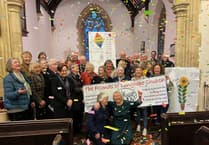A LARGE number of people gathered in The Triangle, Cinderford last week (Tuesday, September 5) as the last surviving Forester to have fought in the Korean War was honoured.
The conflict is often known as the “Forgotten War” but the courage and sacrifice of soldiers from the Gloucestershire Regiment will live on.
Mr Mills was honoured with a parade and service in Cinderford by the Gloucestershire Regimental Association and the naming of a room at the Cinderford Town Council offices in Belle Vue Road.
He was joined by his wife Avril and members of his family for the occasion.
“It’s grand,” he said “it’s certainly not forgotten.”
After the naming of the room at the council offices, veterans, along with standards of the British Legion and regimental associations, marched to The Triangle for the service.
Wreaths were laid on the town’s war memorial by Kenny Dixon, Cllr Graham Morgan and Mark Evans on behalf of the Gloster’s Regimental Association, Cinderford Town Council and the Royal British Legion.
Mr Mills was presented with a clock from Cinderford Town Council which was presented by Vice Lord Lieutenant of Gloucestershire Mr Roger Deeks and a Royal Worcester plate bearing the Glosters’ insignia by Tony Mills, The Rifles’ County Colonel for Gloucestershire.
On April 21 1951 Mr Mills was part of A Company, 1st Battalion The Gloucestershire Regimnt which was about about to take part in the biggest battle the British Army had fought since the Second World War at the Imjin River
Colonel Rob Dixon, who is Chairman of Trustees at the Soldiers of Gloucestershire Museum in Gloucester said: “By the morning of April 25 they were down to around five rounds of ammunition per man.
“They were exhausted after having repelled wave after wave of amss Chinee attacks. 63 of them had been killed and 114 had been wounded.”
When they were ordered to try to make it back to the United Nations’ lines, 63 made it but 530 did not – including Mr Mills – and after a forced march they were to endure two years of brutal captivity.
Col Dixon said: “Roy was a National Service man so did not have to go on active service but along with 103 other young men he volunteered to do so.
“Was it worth it? If you go to South Korea today – and in particular the city of Paju that has grown up near the battlefield – and say you come from Gloucestershire you will be treated like a VIP.
Roy Mills and his comrades deserve to be remembered. Thank you to the Forest of Dean for doing so.
Brigadier Martin Vine, the last commanding officer of the Gloucestershire Regiment before it became part of The Rifles in 1994, said Mr Mills was a highly respected member of the Regimental Association.
He added: “Roy symbolises the fighting spirit of the Foresters,
The Glosters’ succeesors are The Rifles. There, young Foresters continues to serve their country and hold the exemplary example of Roy Mills and his comrades in the highest esteem.”
Mr Deeks read from the report in the Dean Forest Mercury, a forerunner of The Forester, about Mr Mills’ arrival back in Britian in September 1953 on board the Asturias at Southampton.
“Roy Mills was in a contingent of PoWs (Prisoners of War) that included several Forest men: his great friend David Gardiner, Ronald Beddis, Raymond Turley, John Gazzard, John Sladen, Bernard Smith and, later, David Haines and Robert Taylor would follow.
“Roy is the last of that gallant crew.
“The reporter on the dock that day wrote: ‘ Pte Royston Mills, only son of Mr and Mrs William Mills, 9 Foundry Road, Cinderford wants to get home and play football.”
He played for Cinderford Town both before and after his National Service and later for Lydbrook.




